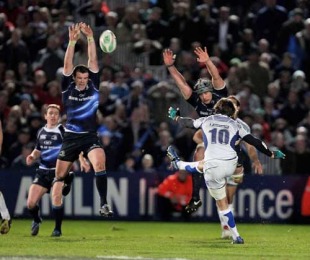|
Heineken Cup
Clermont's lack of silverware baffling
Hugh Farrelly
April 14, 2010

Why have Clermont Auvergne consistently been found wanting in the big games?
© Getty Images
Enlarge
Quite how Clermont Auvergne have yet to win a Top 14 or Heineken Cup title is hard to fathom. The Michelin-sponsored outfit are not short of funds and have created a squad brimming with domestic and overseas talent which, under Vern Cotter and Josef Schmidt, have developed a style of play that marries the finest elements of French rugby. With bruisers such as Thomas Domingo, Jamie Cudmore, Elvis Vermeulen and the magnificent Mario Ledesma in their pack, there is no shortage of snarling, physical forward play while, out wide, their free-flowing, off-loading style benefits from the pace and panache of the likes of Aurelien Rougerie, Julien Malzieu, Seremia Bai and Morgan Parra. Throw in the game control and proven points-garnering skills of Australian out-half Brock James and you have a mix that should be the match of any opposition in France or Europe. So, how do they consistently flop at home (Clermont have lost the last three Top 14 finals, adding to their seven previous runner-up medals) and abroad (they have yet to make the last four of the Heineken Cup)? On the evidence of their 28-29 Heineken Cup quarter-final defeat to Leinster, the problem lies not in the physical but in the psychological make-up of this multi-talented side. Leinster went into this home match as European champions, with a team packed full of international quality from Rob Kearney, Gordon D'Arcy and Brian O'Driscoll in the backline through to Jamie Heaslip, Scotland international Nathan Hines and South African World Cup-winning prop CJ van der Linde up front. They were blown away in the first quarter. A stunned RDS looked on as Clermont hit the champions from every angle and when they went 10-0 up after completely dominating position and possession, a Heineken Cup hammering looked very much on the cards. Leinster build their game-plan around a miserly defensive system developed under former Leinster and Ireland centre Kurt McQuilkin, which backboned their drive to the Heineken Cup title last season. That system was typically effective in shutting out Munster during their Good Friday Magners League victory in Thomond Park a week earlier but was cut open at will by Clermont, who ended the night with numerous line-breaks and three tries, all from left winger Malzieu. In ordinary circumstances, that would have been enough for a comfortable passage to the semi-finals but this was an extraordinary test of mental fortitude and Clermont's frailty, allied to Leinster's resolve in this area, proved the difference. The build-up had focused on the importance of the place-kicking duel between the out-halves. Jonathan Sexton's difficulties off the tee had been the subject of much scrutiny since missed kicks afforded Scotland an unlikely victory and denied Ireland a Triple Crown in their last Six Nations outing. Meanwhile, James had been banging them over all season for Clermont and had France's Grand Slam goal-kicking hero Morgan Parra as back-up. But, as has been well recorded, it was the Clermont pair who fluffed their lines and Leinster who collapsed over the line. It created the perfect scenario for Leinster coach Michael Cheika ahead of their semi-final showdown in Toulouse. As the Australian subsequently noted, the French sides do not truly rate Leinster in the same way they regard Munster and the nature of the victory over Clermont, allied to injury doubts over Sexton, Kearney and (to a lesser extent) O'Driscoll, means it will be hard to quell the sense of confidence down Toulouse way in the run-in to the semi-final. Munster have built up a healthy respect among French opponents following numerous victories in France over many years allied to their two final wins over Biarritz in 2006 and Toulouse in 2008. Leinster's most significant result against a French side was their quarter-final victory in Toulouse, but that was four years ago. Toulouse will look at last season and see a Leinster side that lost to an out-of-form Castres at the pool stages before captured their first Heineken Cup title without having to face a French side at the knock-out stages. However, if this leads to any sense of complacency among Guy Noves' men, it could be extremely costly. It was not easy but, over the past five seasons, Cheika (with the help of sports psychologist and former All-Ireland winning Armagh footballer Enda McNulty) has instilled a deep sense of self belief in his squad which manifests itself in a refusal to panic no matter how adverse the circumstances. Toulouse are a superb rugby outfit and some of their multi-phase play in their quarter-final victory against Stade Francais was breath-taking to behold. In the sunshine of a May afternoon at the Stade Toulousian, everything appears set up for France to provide the first contender for the Paris finale three weeks later. However, Noves needs to guard against complacency for Leinster have an iron will and if they detect any such mental weakness, their opponents could find themselves in a bewildered state at the final whistle wondering how the hell they lost. Just ask Clermont Auvergne. © Scrum.com Hugh Farrelly is the rugby correspondent for the Irish Independent
|
Live Sports
Communication error please reload the page.
-
Football
-
Cricket
-
Rugby
-
- Days
- Hrs
- Mins
- Secs
F1 - Abu Dhabi GP
Abu Dhabi Grand Prix December 11-131. Max Verstappen ()
2. Valtteri Bottas (Mercedes)
3. Lewis Hamilton (Mercedes)
4. Alexander Albon ()
5. Lando Norris ()
6. Carlos Sainz Jr ()
-
ESPNOtherLive >>
Darts - Premier League
Golf - Houston Open
Snooker - China Open
Tennis - Miami Open

